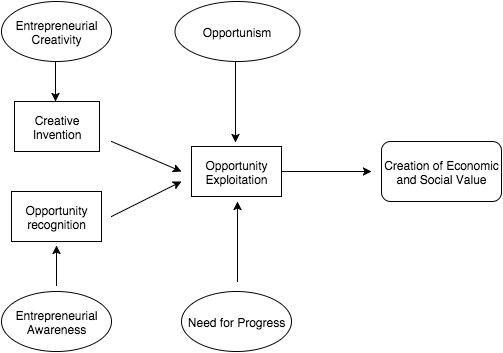Time to read: 4 min
If you’ve ever watched ABC’s Shark Tank, you may have heard one of the investors say something like, “I think you’re really smart and have a great idea, but you’re an inventor — not an entrepreneur.”

Whether you like Shark Tank as a form of entertainment or not, I think the seperation of these two personas, inventor vs entrapreneur, brings up an interesting question: What qualifies someone as an “entrepreneur”?
With the rise of crowdfunding platforms like Kickstarter and Indiegogo, entrepreneurship is a path available to more and more people — if you have a great idea, there is a way to bring it to the masses.
But does entrepreneurial potential perhaps presuppose more than just a great idea and a desire to see that idea come to fruition?
Researchers at the University of London think so.
I recently came across an interesting test of entrepreneurialism developed by 2 psychologists from the University of London, in which they identify 4 dimensions of entrepreneurial potential:
1. Entrepreneurial Awareness
The entrepreneurial awareness scale assesses your ability to spot economically and socially valuable opportunities. There are a 4 sub-factors that come into play here:
- Access: Do you have access to the information necessary to help you identify opportunities?
- Understanding: Armed with the right information, do you have the understanding required to recognize those opportunities as valuable?
- Memory and organization: Are you able to store and organize valuable information in a such a way that makes you more alert?
- State of being: Do you passively wait for opportunities to come your way or do you actively seek them out?
It’s interesting to note that 2 of these factors relate more to personal opportunity than natural-born traits. In order to possess entrepreneurial awareness, you need to have access to the right information and you also need to have the knowledge, or education, required to turn that data into something useful.
2. Opportunism
The second identified dimension is opportunism, defined as the tendency to exploit opportunities.
According to the research, different people will be more or less likely to exploit a given opportunity based on a few characteristics:
- Willingness to bare risk
- Optimism
- Self-efficacy
- Proactivity
- Prior experience
The researchers are careful to note, however, that while these attributes increase the probability of pursuance, they may not actually increase the probability of success.
3. Entrepreneurial Creativity
Entrepreneurial creativity is defined as your ability to come up with ideas that are novel and useful.
I think most of us would agree that creativity is at the core of successful entrepreneurship. You can recognize a thousand great opportunities and have the guile to exploit them, but if you fail to come up with an innovative solution, then well, you don’t have much.
So naturally, research has shown that creativity is closely linked to the number — and radical nature of — innovations developed by businesses and organizations. It doesn’t in fact say anything about creativity being linked to the financial success of those innovations, but it’s the prerequisite of their existence.
4. Need for Progress
Lastly, the need for progress scale assesses your motivation to create productive change and progress for yourself and society.
Research has demonstrated that more ambitious and long-term growth goals are related to entrepreneurial activity. These types of goals can be things like:
- Rate of organizational change
- Increased business performance
- Amount of control exercised over the firm
Additionally, it’s been shown that elaborate and proactive planning predicts business size and the external evaluation of a business.

So — what does all this amount to? By answering questions related to these dimensions of entrepreneurial potential, you end up with an “entrepreneurial potential score,” which assesses “your general tendency and ability to engage in entrepreneurial behavior.”
(It’s interesting that ability and tendency come into play here: you might have the ability but perhaps not the inclination.)
After taking the test, my overall score was 79%, which suggests I’m highly entrepreneurial (at least according to my own sense of self..), even though I scored only average on the first two categories, entrepreneurial awareness and opportunism.
It seems that my characteristic propensity towards the other 2 dimensions (entrepreneurial creativity and need for progress) compensate adequately for my relative ineptitude in the other 2 dimensions of entrepreneurialism.
Here’s why I think this information is valuable.
1. It’s important to separate creativity from entrepreneurialism as a piece of the whole.
It’s not enough to have a good idea. There are a multitude of factors that contribute to building and growing a successful business, and these dimensions provide some insight into what those factors are.
2. Self-awareness allows you to build your skills.
I believe many, if not all, of these dimensions can be learned vs gifted. For example, skills mentioned in the test such as data organization, developing an attitude of long-term vs short-term thinking, and even creativity I believe can all be learned.
So if you desire to be entrepreneurial, but find yourself lacking in one or more of the important dimensions, a greater sense of self-awareness will empower you with the knowledge you need to become the person you wish to be.
3. This is valuable information for choosing the right Co-founder.
If you’re looking to start your own company, a greater degree of self-awareness will also help you understand which characteristics your Co-founder should show the greatest propensity towards to help balance your own skills and personality traits.
You can take the test for yourself here and while I don’t think this test is a definitive judgement by any means, it provides some key insights into the characteristics relevant for entrepreneurialism.










